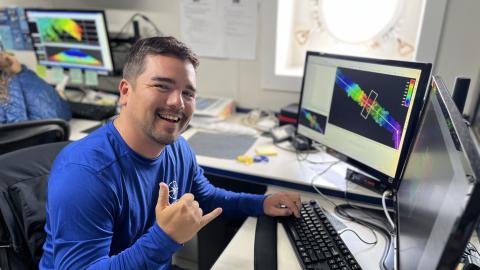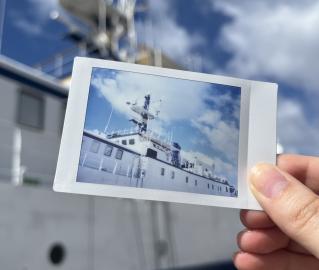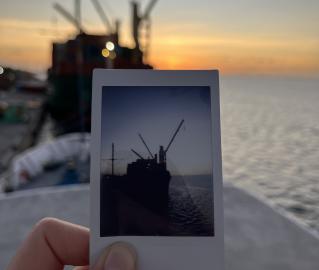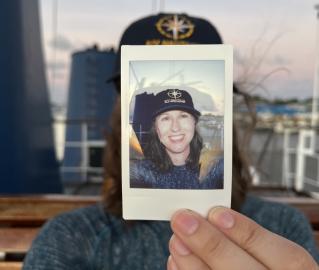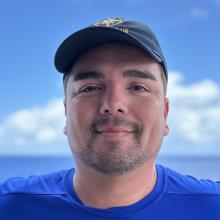
Diego Johansen
Tell us about your work/research. What kinds of things do you do?
As a Field Technician with the Pacific Islands Ocean Observing System, I specialize in coastal water quality monitoring, collecting data that supports marine research and environmental management in Hawaii and the Pacific Islands. I deploy and maintain water quality buoys with sensors to measure temperature, salinity, turbidity, dissolved oxygen, and chlorophyll levels. These data track water quality changes, detect pollution, and reveal environmental trends. My fieldwork involves boat trips along the coast of Hawaii Island to service equipment and collect samples. In the lab, I process data, troubleshoot technical issues, and help make ocean information accessible to researchers and communities. This role combines marine science with technology, providing hands-on experience while supporting conservation efforts in Hawaii.
What sparked your initial interest in your career?
Growing up in Southern California, the ocean captivated me from an early age. While I enjoyed all outdoor activities like hiking and camping, my first SCUBA dive transformed my perspective completely. Descending beneath the surface, I experienced a profound mental expansion, suddenly comprehending an entire world that had always existed beyond my awareness. The underwater realm brought me a peace I'd never known before. That pivotal moment shaped my future. I realized that ocean conservation would be my calling, driven by a desire to protect these vast, misunderstood ecosystems that cover most of our planet, yet remain largely unexplored. The ocean had revealed its magic to me, and I committed myself to preserving that magic for generations to come.
Who influenced you or encouraged you the most?
I was inspired to pursue deep-sea exploration by a former colleague, a marine biologist who worked as an Ocean Campaigner/Activist. He piloted a research submarine and became the first person to photograph the seafloor of Antarctica, capturing images of previously undiscovered deep-sea creatures. The potential of that being a possibility had a major influence on the direction of my career.
What element of your work/study do you think is the most fascinating?
I'm fascinated by marine science technologies like ROVs, USVs, and sonar systems. These tools collect vital data from previously unreachable ocean environments, enhancing research efficiency and expanding our understanding of marine ecosystems. Immersing myself in the ocean world and connecting with marine life has transformed my perspective. These experiences deepen my appreciation for my career path and the interconnectedness of all life. Witnessing the ocean's complexity firsthand provides a profound sense of purpose and wonder that makes me grateful to exist on this remarkable planet.
How did you get involved with the Ocean Exploration Trust?
I first heard about the E/V Nautilus years ago while watching their deep-sea live cam footage, captivated by the mysteries of the ocean depths. My interest in ocean exploration deepened further when I attended the OCEANS 2024 Conference in Halifax, Nova Scotia, where I had the opportunity to meet a program director from OET. At the time, I was exploring the idea of pursuing a master’s degree and a career in deep-sea research and ocean exploration.
During our conversation, they encouraged me to apply for a position aboard the E/V Nautilus—so I did! I'm thrilled to be joining the expedition team as a Seafloor Mapping Intern, where I’ll contribute to cutting-edge ocean exploration and further my passion for deep-sea science.
What other jobs led you to your current career?
My journey into marine science began with environmental activism, where I was trained by Al Gore and The Climate Reality Project. I went on to organize large-scale sustainability events, lead local plastic reduction campaigns, and coordinate beach cleanups, working to drive tangible change in my community. This work led me to Greenpeace USA, where I played a key role in campaigns to reduce plastic pollution, halt deep-sea mining, and advocate for the protection of 30% of the world’s oceans by 2030.
Through these experiences, I realized that science is the foundation of effective environmental advocacy, inspiring me to deepen my knowledge by pursuing a Marine Science degree at the University of Hawaii at Hilo. Now, as a Field Technician with the Pacific Islands Ocean Observing System (PacIOOS), I manage water quality buoys around the Big Island, merging marine science with technology. This role has further expanded my expertise in science communication, networking, and tech-driven conservation efforts, reinforcing my commitment to ocean protection. Looking ahead, my goal is to focus on deep-sea research, working to safeguard some of the most fragile and least understood ecosystems on the planet.
What are your degrees and certifications?
Bachelor's of Science in Marine Science at University of Hawai`i at Hilo 2025
What are your hobbies?
I have an endless love for scuba diving and exploring the underwater world—there’s nothing quite like encountering marine life in its natural habitat. Swimming alongside sea turtles, sharks, and dolphins is both exhilarating and humbling, a reminder of the ocean’s vast beauty and mystery. My passion for the sea extends beyond diving; I also love being on boats, whether conducting research, sailing, or fishing.
Living on the Big Island of Hawaii is a constant adventure. On clear nights, I love stargazing on the slopes of Mauna Kea, beneath some of the darkest skies in the world. And when Kīlauea erupts, I make it a point to witness the raw power of our planet—watching molten lava create new earth right before my eyes is an awe-inspiring and humbling experience.
What advice would you give someone who wants to have a career like yours?
If you are interested in pursuing a career in an ocean-related field, I would absolutely recommend following that dream. Our planet desperately needs passionate people dedicated to understanding and protecting marine ecosystems. Here's my advice: Learn capabilities beyond just marine biology itself. Skills in data analysis, GIS mapping, programming, calculus, chemistry, or policy can make you incredibly valuable. Get hands-on experience by volunteering for beach cleanups, interning at aquariums, or join research expeditions! Make sure you are networking and connecting with professionals already working in ocean conservations by attending conferences or joining local organizations. The rewards are extraordinary, as you get to work in beautiful places with passionate colleagues and can genuinely make a difference for our planet.
Expeditions
Diego participated in the following Ocean Exploration Trust expeditions:
